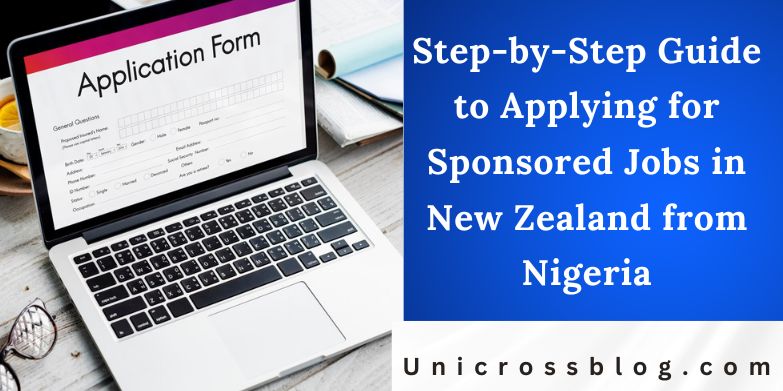Relocating to New Zealand from Nigeria for work is an exciting opportunity, but it requires careful planning and understanding of the job market and visa processes. New Zealand offers a high quality of life, a vibrant economy, and a demand for skilled workers in various industries, making it an attractive destination for Nigerian professionals. However, securing a sponsored job is essential, as most work visas, such as the Accredited Employer Work Visa (AEWV), require a job offer from an accredited employer.

Step-by-Step Guide to Applying for Sponsored Jobs in New Zealand from Nigeria
Step 1: Research the New Zealand Job Market
Start by identifying industries in New Zealand with a high demand for skilled workers, particularly those offering visa sponsorship. Key sectors include healthcare, information technology, agriculture, construction, engineering, and education. Some roles, like dairy farming or healthcare positions, are listed on New Zealand’s Green List, which offers fast-track pathways to residency for in-demand professions. Assess your skills, qualifications, and experience to determine where they align with these opportunities. Consider regional job availability, as opportunities vary between urban areas like Auckland and rural regions.
Step 2: Check Visa and Qualification Requirements
Most sponsored jobs in New Zealand require a work visa, typically the Accredited Employer Work Visa (AEWV). To qualify, you must have a job offer from an accredited employer who has completed a job check with Immigration New Zealand. Additionally, verify if your profession requires occupational registration (e.g., medical professionals must register with the Medical Council of New Zealand). If your qualifications were obtained in Nigeria, you may need to have them assessed by the New Zealand Qualifications Authority (NZQA) to ensure they meet local standards. Ensure you meet English language requirements, particularly for jobs classified under ANZSCO skill levels 4 or 5, which may require proof of proficiency.
Step 3: Build a New Zealand-Style CV
A New Zealand-style CV is concise, typically two to three pages, focusing on relevant skills and work experience rather than an exhaustive list of past jobs. Highlight specific examples of how you’ve used your skills, supported by awards, certificates, or achievements. Include contact details for referees, such as former employers, who can verify your experience. Have your CV reviewed by an English speaker to ensure clarity and correct grammar, as errors can harm your application. Tailor your CV to each job, emphasizing how your overseas experience aligns with the employer’s needs.
Step 4: Write a Compelling Cover Letter
A cover letter is a critical part of your application. It should be concise, personalized, and demonstrate your enthusiasm for the role and the company. Explain why your skills and experience make you a strong candidate, and highlight your understanding of New Zealand’s work culture or industry needs. Avoid generic templates; instead, show your motivation for relocating and how your background adds value. Have the cover letter proofread to ensure it is professional and error-free.
Step 5: Search for Sponsored Jobs
Explore job opportunities through various channels. Major job platforms like SEEK and Trade Me Jobs list vacancies, some of which explicitly mention visa sponsorship. Contact recruitment agencies specializing in international candidates, as they can connect you with employers seeking overseas talent. Networking is crucial—reach out to professionals in your field via LinkedIn or industry forums to learn about unadvertised opportunities. You can also contact employers directly to inquire about roles, especially in industries with skill shortages. Be cautious of job offer scams, which are common in regions like South Asia and Africa, and verify the legitimacy of any offer.
Step 6: Conduct Informational Interviews
Informational interviews are informal conversations with professionals in your industry in New Zealand. These discussions help you understand the local job market, workplace culture, and specific employer needs. To arrange them, identify contacts through your network, LinkedIn, or mutual connections in Nigeria or New Zealand. Prepare thoughtful questions about the industry, required skills, or challenges in the role. These interactions can build your professional network and potentially lead to job referrals.
Step 7: Apply for Jobs
Submit applications for roles that match your skills and offer visa sponsorship. Follow the employer’s application instructions carefully, ensuring all required documents, such as your CV, cover letter, and evidence of qualifications, are included. If your documents are not in English, provide certified translations. Track your applications to stay organized and follow up politely if you don’t hear back within a reasonable timeframe.
Step 8: Prepare for Interviews
Interviews in New Zealand may be conducted virtually (via Zoom or Microsoft Teams) for overseas candidates. They are often informal but require thorough preparation. Research the company and role, and be ready to discuss how your skills and experience align with their needs. Employers value cultural fit, so demonstrate collaboration, problem-solving, and initiative. Prepare examples of past achievements, such as how you solved a problem or drove a project to completion, as these are highly valued.
Step 9: Secure a Job Offer
Once you receive a job offer, review it carefully to ensure it meets visa requirements. The employer must be accredited and provide a unique link to apply for the AEWV. Verify the job’s ANZSCO skill level and ensure you meet any additional requirements, such as work experience or certifications. Be cautious of offers requiring payment for sponsorship, as this is a red flag for scams.
Step 10: Apply for the Accredited Employer Work Visa
With a job offer, apply for the AEWV through the Immigration New Zealand website. Submit required documents, including your passport, job offer letter, employment certificates, and, if necessary, police and medical certificates. Ensure all documents are complete to avoid delays. The visa allows you to work for the sponsoring employer for up to five years, depending on the job and skill level.
Step 11: Plan Your Relocation
Once your visa is approved, plan your move to New Zealand. Research housing, healthcare, and local amenities in your destination. Connect with Nigerian communities or expat groups in New Zealand for support. Budget for relocation costs and prepare for cultural adjustments, such as adapting to New Zealand’s collaborative and relaxed work environment.
READ ALSO: Australia Sponsorship Jobs for Nigerians Without IELTS
FAQs
Do I need a job offer to apply for a work visa in New Zealand?
Yes, most work visas, including the Accredited Employer Work Visa, require a job offer from an accredited employer. Without a job offer, options like the Working Holiday Visa or Skilled Migrant Category may be considered, but they have specific eligibility criteria.
How can I find employers offering visa sponsorship?
Search job platforms like SEEK or Trade Me Jobs, contact recruitment agencies, or network with professionals in your field. Some employers explicitly advertise visa sponsorship, particularly in industries with skill shortages like healthcare or IT.
What if my qualifications are not recognized in New Zealand?
You may need to have your qualifications assessed by the New Zealand Qualifications Authority (NZQA). Some professions also require registration with a regulatory body, such as the Medical Council for healthcare roles.
Are there risks of job offer scams?
Yes, job offer scams are common, especially targeting overseas applicants. Never pay an employer or agent for a job offer, and verify the employer’s accreditation status with Immigration New Zealand.
How long does the visa application process take?
Processing times vary, but a complete AEWV application typically takes a few weeks. Ensure all documents are accurate and complete to avoid delays.







